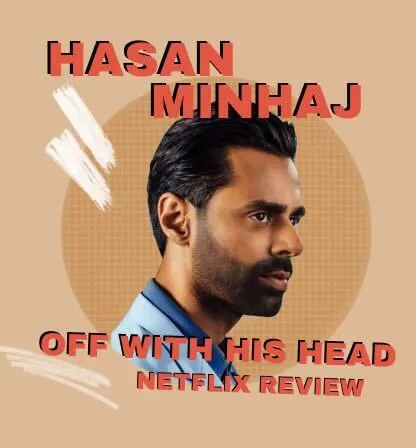Hasan Minhaj’s comedy has long been about displaying introspective content in fresh forms. From his work on “The Daily Show” to “Patriot Act,” he has aimed to inform audiences about current issues, not without doing some light damage to the reputations of various figures and corporations. In the past, he has been successful. But after a New Yorker article fact-checked his comedy and blemished a mostly spotless career, his jokes have shifted perspective.
Minhaj’s new Netflix special “Off With His Head,” released in October, dismisses the situation as a “dorky controversy” (which it probably is), though its effects do seem to ripple in the new special’s jokes and structure. Minhaj used to tell us sweeping personal sagas about cultural difference; their punchlines were the dramatic, heart-wrenching center of each special.
This time, there is no unifying theme, only distinct topics loosely orbiting the topical division of the U.S. This time, the jokes are just jokes. There is no bigger story here, and Minhaj does not lecture. He wobbles and stumbles alongside us as we watch politics unfold and observe unexpected cultural phenomena. In this special, we see a more traditional comedian, and a more experienced one. His delivery is spot-on — I was laughing and even clapping along with the audience, despite the screen separating us.
Minhaj sets the mood for the evening by poking fun at San Jose, where the special was filmed. He gestures to the front rows and says, “Los Altos, Palo Alto, Stanford area. Yes, you definitely drive a Tesla. I can see it. The one percent right here. And way the fuck back there we have the 99%.” The joke is met with roaring laughter because with a Bay Area audience, he is probably onto something. Minhaj toes the line between absurdity and truth, which is a key part of what makes his comedy successful. His initial jokes set a precedent of lighthearted audience interaction and creates an air of authenticity that does not waver.
In the meat of the special, Minhaj aligns himself with comedic tradition by riffing on individual audience members and making fun of politics. After an offhand comment about a controversial topic, he says, “That really divided the room. That’s every issue in America now. Everything is binary now.” He gives viewers time to make assumptions about what that binary is, but clarifies that the two sides are not Republican and Democrat. You have two choices: “It’s insane people… and insufferable people.”
In 2024, we want to be like Hasan Minhaj: We want to rise above division and make fun of everyone’s bullshit. Instead of becoming comedians ourselves, we savor Minhaj’s commentary. Minhaj himself points out that he used to be insufferable. He reminds us of the time he corrected Ellen DeGeneres’s pronunciation of his name as a guest on her show. “My life is perfect, and I’m out here arguing with Ellen over vowels,” he jokes. It can feel good to correct people, to speak truth to privilege and to damage another’s reputation. But “Off With His Head” does not indulge. In this special, Minaj self-reflects, and he reflects America back to us.
A central focus of the special is cultural differences. Minhaj explores the ins and outs of “Beige-istan,” a term for ethnic communities outside of the Black-white binary. And his observations are ones you could only hear in America.
“White people, you’re not even the best at racism,” he says. “Try explaining George Floyd to an Indian dad.”
Minhaj’s somewhat shocking but undeniably fresh perspectives lend themselves well to solid comedy. It opens up the room for audiences to laugh at his observations. While Minhaj used to make commentary in service of a larger cohesive story, now, he does it because it’s funny.
Mid-special, Minhaj levels with the audience. “Let’s say what we can’t say at the DEI meeting. Let’s just get it out.” Minhaj uses the hypothetical but relatable example of a DEI meeting as something that his show is not. Clearly, Minhaj is done with cancel culture, but he has not flipped into antagonistic trolling. When he jokes that this comedy show is not a DEI meeting, he is not dropping a buzz word to ignite conservatives, he is telling his culturally diverse and majority liberal audience that tonight, it is simply not that deep.
In my view, the special as a whole exemplifies something important about comedy’s niche in our democracy. It has its own rules that differ wildly from the rules of the professional world, the home, the college campus or the political stage. I would even say comedy is an indicator; to know how society really feels, look at the jokes we tell and consider the jokes we laugh at. It tells us something when Dave Chappelle fans laugh hesitantly at his jokes mocking trans people. It tells us something when Tony Hinchliffe’s Trump rally joke about Puerto Rico meets viral backlash. It tells us something when audiences roll their eyes at social cliches that comedians have exhausted.
There are a lot of things that make comedy funny, and a lot of things that make it unfunny. In my opinion, a fresh and non-hateful perspective is key, and Hasan Minhaj has delivered that from the beginning. But we do not all need to have the same sense of humor. We do need to keep in mind what people are laughing at, because Minhaj is right, comedy shows are definitely not DEI meetings.
Editor’s Note: This article is a review and includes subjective thoughts, opinions and critiques.
